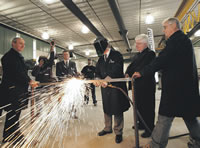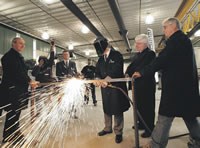
Denis Hubert's passion, inexhaustible energy and reputation for making things happen have brought him full circle. The new president of Sudbury-based Collège Boréal traces his work ethic to summer jobs in the bustling francophone community of Sturgeon Falls, between Sudbury and North Bay.
Starting out as a plumber, Hubert went on to earn graduate degrees in Urban Planning and Public Administration, spent 15 years as a city planner and administrator and another 11 years as vice president of la Cité Collegiale, a francophone community college in Ottawa.
With his appointment as president of Collège Boréal in January, Hubert assumed responsibility for an institution Ontario's mining industry is counting on to help supply the skilled miners and trades people it will need to compensate for a looming retirement wave.
Collège Boréal provides French-language polytechnical training for some 300,000 francophones in Northern, central and southwestern Ontario and operates seven campuses throughout the province.
The college has 1,900 full-time equivalent students and provides training, workforce redeployment, consultation and reskilling services to tens of thousands of youth and adult clients. It offers two and three-year programs for miners, heavy equipment mechanics, welders, industrial electricians, and environmental chemists, and recently opened an ultra-modern 20,000 sq. ft. Trades and Applied Technology Institute at its Sudbury campus.
Promoting the skilled trades and gearing up to supply the needs of Northern Ontario's resource industries will be one of Hubert's main priorities.
According to statistics produced by Skills Canada, 40 per cent of the new jobs in the next 10 years will be in the skilled trades, he said. "In 1998, it was 20 per cent, so this is where the opportunities will be. My concern is whether we're moving fast enough."
Partnerships with industry and secondary schools figure prominently in Hubert's plans to produce the miners, mechanics and electricians needed to fill the vacancies left by retiring workers.
"At some point," he said, "the government started de-investing in the trades. There was a period when the trades were very unpopular. Our job is to reorient that image and convince government to begin re-investing in instructional equipment."
To encourage high school students to consider the skilled trades as a career choice, Collège Boréal will make its own shop facilities available to high school students and in some cases, provide equipment to the schools themselves.
"We're doing it because want young people to get interested in the trades when they're still in high school," he said.
Industry needs
Remedying the skilled trades deficit will also require close co-operation with industry partners, including Xstrata, CVRD Inco and the members of the Sudbury Area Mining Supply and Services Association to ensure the college is responding to the mining industry's needs.
"I was at a recent mining industry event and asked some of the people from Xstrata and Inco what they need. They asked me what we have and I said 'Miners, heavy equipment mechanics, electricians, welders, etc.,' and their response was 'All of the above.'"
Mark Cutifani, recently appointed chief executive officer of CVRD Inco, has estimated that in the next four or five years, 30 per cent of the company's workforce will be retiring, said Hubert.
Trades people today, he said, work with highly sophisticated machinery and computers and earn big money.
"I've had situations where parents have come to me to complain that we convinced their son or daughter to enroll in a skilled trades program. They'll say, 'My son should be a university graduate.' I get so frustrated when I hear that from parents.
"Trades people work with CNCs and highly automated equipment. Mechanics have to learn how to use a computer and programming automated welding machines requires a knowledge of sophisticated com-puter software."
Currently, Collège Boréal offers 13 pro-grams in the skilled trades, but Hubert has committed to doubling that num-ber within four years. Over the pre-vious decade, it has provided training for more than 10,000 students in courses and programs, including apprenticeship, post secon-dary, trades, health and safety and other industry training programs. In the next four years, it has set a target to train 12,000.
Expansion
The college's Trades and Applied Technology Institute was just opened in September, but plans are already in the works to expand it to accommodate construction, electrical instrumentation, welding, robotics and automobile service technician programs. A new campus in Timmins is also being studied.
Another challenge Hubert intends to tackle is the development of articulation agreements between colleges and universities to ease the flow of students from one institution to another.
"We have the ability as a community college to attract young people who never imagined that they had the potential for a post secondary education," he explained.
Once convinced of their potential, some of them may want to continue on to university, but are discouraged from doing so if they are unable to get credit for their college courses. Articulation agreements could work both ways, also easing the transfer of university students to more practical diploma and certificate programs at the college level.
Under Hubert's leadership, Collège Boréal will also strive to tap into the pool of francophone-speaking immigrants in southern Ontario.
Immigrants from Europe flocked to Northern Ontario to work in the region's mines and mills through the first half of the 20th century, but Toronto, Montreal and Vancouver are the preferred destinations of today's newcomers.
"The Sudbury area is booming," said Hubert. "The economy is in excellent shape and the job potential is great. Somehow, that message has to get filtered down to Toronto."



